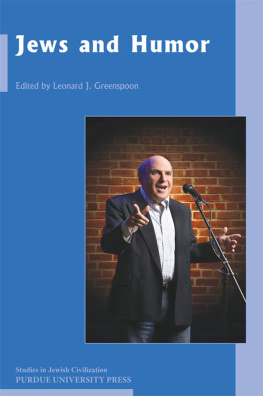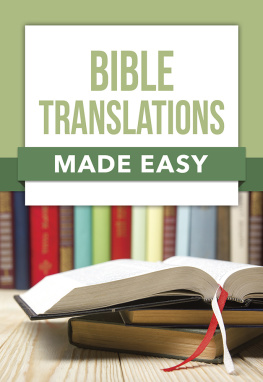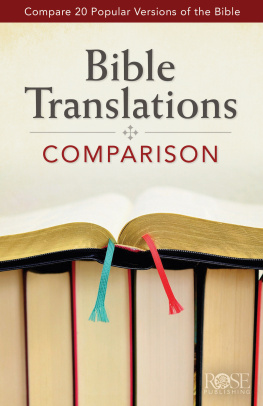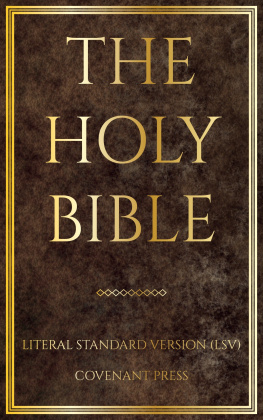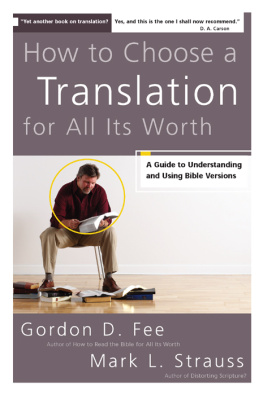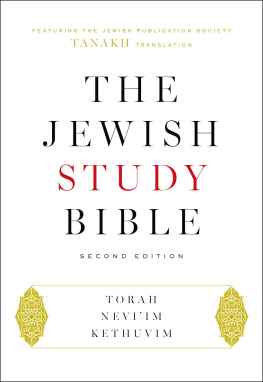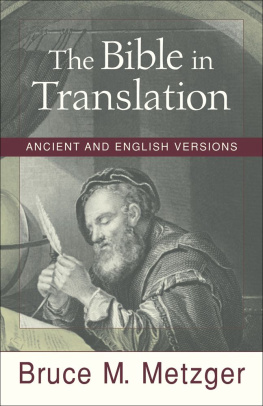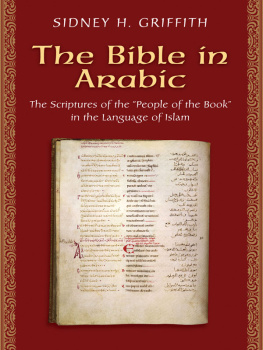
Translating their Bible has been a major cultural activity of Jewish communities for well over two thousand years and on several continents, and yet few Jews today know about this history or why it matters. This massively learned but accessible volume admirably fills that glaring gap. I highly recommend it to Jewish and Gentile readers alike!
Jon D. Levenson, author of Inheriting Abraham: The Legacy of the Patriarch in Judaism, Christianity, and Islam
This is an irresistible book. Greenspoon distills a lifetime of learning into a lively account of famous and not-so-famous versions of Hebrew scripture in diverse languageseven Chinese. Sages and eccentrics populate his pages.
Ronald Hendel, Norma and Sam Dabby Professor of Hebrew Bible and Jewish Studies, University of CaliforniaBerkeley, and author of The Book of Genesis: A Biography
No one has more information at their fingertips than Greenspoon, and this book will inevitably become a resource for anyone working in translation. The book should also appear on course syllabi in Bible studies as well as the history of Bible translation and inform scholarship in translation studies as well.
Naomi Seidman, University of Toronto Department for the Study of Religion
The only comprehensive guide on the subject, from earliest times to the present, Jewish Bible Translations is a masterful work from a master craftsman. By marrying profound erudition with lucid explanations, provocative questions and comments, and a light, sometimes whimsical touch, Greenspoon is sure to engage both scholars and laity alike.
Alan Levenson, Schusterman/Josey Chair in Judaic History, University of Oklahoma
Do all Jews understand the Bible in the same way? The answer can be found in this fascinating and comprehensive volume that explains how and why Jews translated the Biblefrom the earliest translation into Greek to contemporary English translations and, along the way, to Aramaic, Arabic, Yiddish, and European languages. We encounter the translators, their interpretive traditions, and the agendas that inform their decisions. This book is a wonderful entre into the Jewish engagement with the Bible.
Adele Berlin, Robert H. Smith Professor of Biblical Studies (Emerita), University of Maryland, and coeditor of The Jewish Study Bible
A masterfully broad surveyboth chronologically and geographicallyin a wonderfully engaging work by the dean of Jewish Bible translation.
Marc Zvi Brettler, Bernice and Morton Lerner Professor in Judaic Studies, Duke University, and author of How to Read the Bible
Jewish Bible Translations
Personalities, Passions, Politics, Progress
Leonard Greenspoon

The Jewish Publication Society | Philadelphia
University of Nebraska Press | Lincoln
2020 by Leonard Greenspoon
Cover designed by University of Nebraska Press; cover image: Paper background: Karramba Production / Shutterstock.com.
Author photo Mark Kirchhoff / On the Mark Photography.
Acknowledgments for the use of copyrighted material appear on page , which constitutes an extension of the copyright page.
All rights reserved. Published by the University of Nebraska Press as a Jewish Publication Society book.
Library of Congress Cataloging-in-Publication Data
Names: Greenspoon, Leonard J. (Leonard Jay), author.
Title: Jewish Bible translations: personalities, passions, politics, progress / Leonard Greenspoon.
Description: Philadelphia: The Jewish Publication Society; Lincoln: University of Nebraska Press, [2020] | Includes bibliographical references and index.
Identifiers: LCCN 2020007877
ISBN 9780827613126 (paperback)
ISBN 9780827618558 (epub)
ISBN 9780827618565 (mobi)
ISBN 9780827618572 (pdf)
Subjects: LCSH : Bible. Old TestamentTranslating. | JudaismHistory. | JewsHistory.
Classification: LCC BS 1132 . G 74 2020 | DDC 221.4dc23
LC record available at https://lccn.loc.gov/2020007877
The publisher does not have any control over and does not assume any responsibility for author or third-party websites or their content.
Contents
Doing research in the humanitiesand that is the category into which this book fitsis necessarily a solitary activity in some respects. Sifting through masses of material, both primary and secondary, requires a singular dedication and focus. Ultimately, the researcher has sole responsibility for the thoroughness of documentation and the thoughtfulness of assigning a greater degree of credibility to some views over others. In this sense, the researcher is a scholar.
At the same time, doing research in the humanities ought not to be a lonely activity. Sharing insights, seeking out others opinions, entering into the give-and-take of interactive discussionthese also are essential elements of what goes into the preparation and presentation of years, often many years, of combing through archives, grappling with difficult concepts, and trying to make sense out of accumulations of data. In this sense, the researcher is a member of one or more scholarly communities.
I have been, I think it is fair to say, blessed by the collegial friendships I have enjoyed over many years. For insights into Jewish Bible translations, the topic of this book, I especially want to recognize, acknowledge, and thank Harry M. Orlinsky, Fred Greenspahn, Ed Greenstein, Jonathan Sarna, and Naomi Seidman.
Every word, expression, sentence, and section of this book bears witness to the superb work of JPSs managing editor, Joy Weinberg. From first draft to last, her insistence on excellence improved and enhanced my writing, even after I thought it was as good as I could get. JPS director Rabbi Barry Schwartz and the staff at the University of Nebraska Press, the publishing partner of this book, have also been unfailingly responsive and supportive.
More durable than even the closest professional connection are family relationships. I have been married more than fifty years (no, Ellie and I werent quite child bride and groom!), with two daughters, Gallit and Talya, two sons-in-law, Elan and Andrew, and twin grandchildren, Gefi and Shoshi. And I hope the family continues to grow. Whether as dad or papa, my experiences with the family are more precious to me than any others.
And yes indeed, there is something especially meaningful and worthwhile now that I can share my love of teaching and learning with my immediate and extended family members, who dont ever seem bored with discussions of Septuagint translators or Saadiah Gaon or Max Margolis, among others. Who could ask for anything, or anyone, more!
Anyone going into a large bookstore these days is confronted with, and perhaps perplexed by, an array of Bible translations. Most of these are produced by and marketed to Christians, primarily Protestants, but also Roman Catholics and adherents of the Orthodox churches. Either in the Bible section, or more often among books classified as Judaica or Jewish studies, one or more Jewish versions may be found. The relative paucity of modern-language translations by and for Jews obscures two related points of preeminent importance: (1) Bible translating began among Jews; and (2) all subsequent translations, whether under Jewish, Christian, or inter-denominational sponsorship, are profoundly Jewish.
Sadly, both Jews and Judaisms substantial contributions to scriptural translation have gone largely unrecognized or underacknowledged, even among specialists who really should know better. In this connection, I call attention to non-Jewish scholars who, discussing the subject of English-language Bible translation, completely ignore the very existence of Jewish translators and translations. Such is the case with the well-known biblical scholar and translator Jack P. Lewis, who claims, with the title of his book, comprehensive coverage of
Next page


